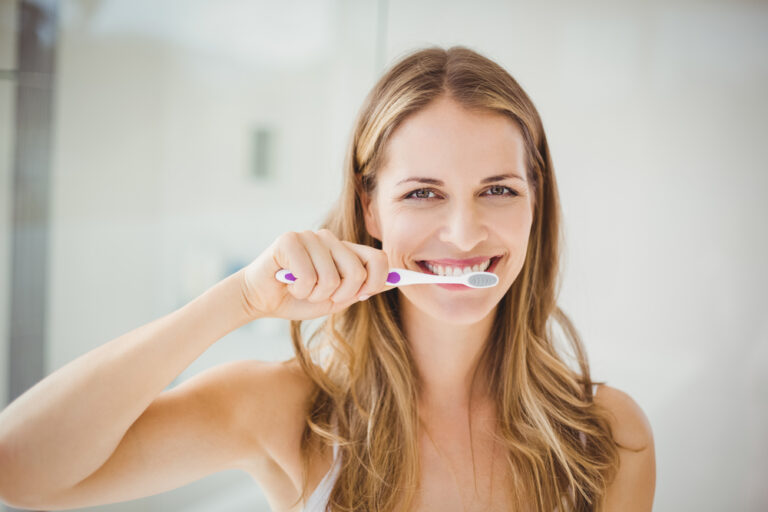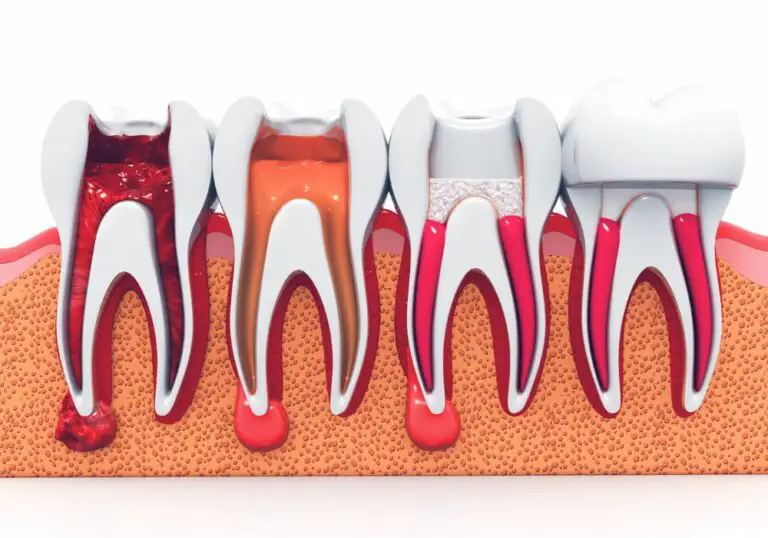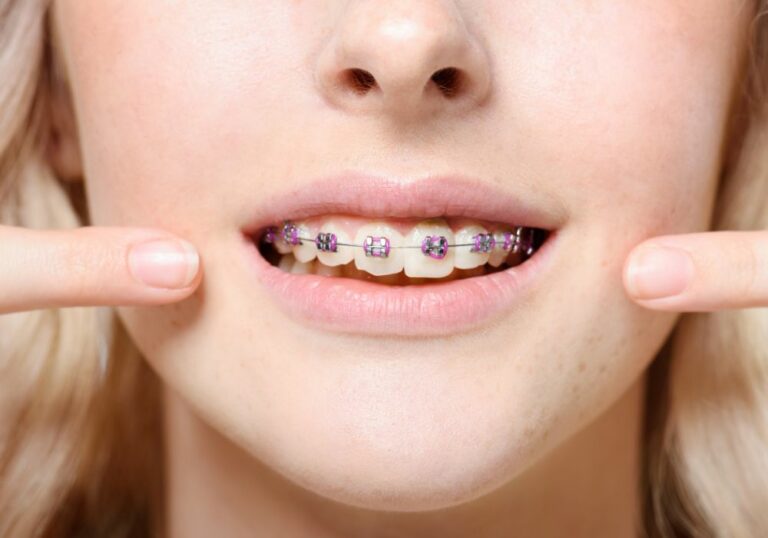Why do I have black spots on my teeth, yet I brush and floss regularly?
Sometimes, adopting good oral hygiene practices is not enough to shield your teeth from discoloration.
Although certain forms of tooth staining are harmless, black spots pose a threat to your oral health. This rings true, especially if they develop near your gum line.
Besides affecting your radiant smile, black spots occasionally point to more serious dental health issues like cavities and tooth decay.
Chances are, this is not what you expected to hear. But don’t worry! This post explores the causes of black spots on teeth and how to get rid of them. Furthermore, it highlights effective ways to prevent this type of tooth discoloration.
Do you want to get rid of these pesky black spots and regain your bright, healthy smile? Join us below!
Why Are My Teeth Turning Black Near Gums?
Dark marks on the tooth are not normal and are often a sign of oral health problems. But what causes them?
Well, this section sheds some light on the most common causes of black spots on teeth. Let’s check them out.
1. Plaque and Tartar Buildup
If you often forget to clean your teeth properly, a sticky yellow film will start forming on their surface, as well as under the gums. This yellow film is known as plaque and consists of bacteria, leftover food debris, and saliva.
Over time, plaque buildup hardens, forming tartar, which gradually turns from yellow to blue to dark brown and eventually black. Tartar buildup (dental calculus) is not only unsightly but can cause gum diseases like gingivitis.
2. Cavities
Plaque and tartar usually create a shield for bacteria, allowing them to feed on sugars and starch in the mouth. In return, the bacteria produce acids that remove minerals in your teeth’s enamel, causing tiny openings or cavities.
If left untreated, bacteria and acid can burrow into the next layer of your tooth; dentine. At this stage, you might notice some dark brown or black spots on your tooth.
In addition to the dark stains, you may develop the following symptoms:
- Increased tooth sensitivity to hot and cold drinks and food
- A persistent ache in the affected tooth
- Bab breath
- Bleeding gums
- Facial swelling
Have you experienced any of these signs and symptoms? Visit your dentist’s office as soon as possible to stop further damage to your teeth and prevent other complications.
3. Dental Trauma
Dental injuries, especially those that affect primary teeth can influence the development of permanent teeth. One main consequence of primary teeth trauma is the growth of adult teeth with discoloration, which can darken over time. It also causes enamel hypoplasia and root dilaceration.
Additionally, dental trauma can cause damage to your tooth’s interior (pulp). Remember, the pulp contains blood vessels, connective tissues, and nerves.
So, if your tooth chips, cracks, or gets dislodged, the blood vessels in the pulp might rupture and bleed. This can cause a dark brown or black spot in the injured area, seen through the dentin and enamel.
4. Discoloration Caused by Medications
Medications like tetracycline( a broad-spectrum antibiotic) can seep into calcified tissue like teeth, causing permanent discoloration of crowns. The discoloration can range from yellow or gray to dark brown or black, depending on a few factors, such as:
- Dosage received
- Length of treatment
- Stage of tooth development before exposure
5. Surface Staining
Certain foods and beverages, like coffee, red wine, and tea can cause dark stains on teeth surface. Even worse, the stains could penetrate your tooth enamel, leading to discoloration and the formation of black patches. Smoking and tobacco use can have the same effect too.
6. Fluorosis
Another common cause of black spots on teeth is fluorosis. This is a condition caused by excess fluoride intake in the early years of life.
Maybe you used to swallow toothpaste or take fluoride-rich vitamin supplements. Either way, the excess fluorine will manifest as white or dark spots on your tooth surface. In rare cases, pits might form in your teeth.
Why Should I Get Rid of Black Spots on Teeth Near Gums?
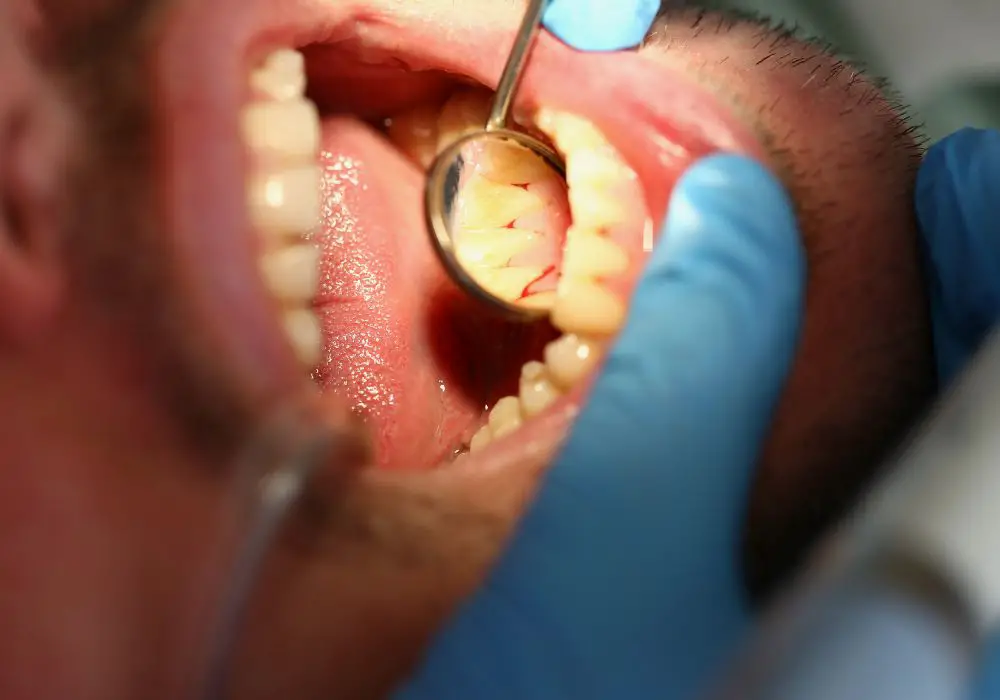
If the dark spots on your teeth are caused by plaque and tartar buildup, get in touch with your dentist. If not, you might become susceptible to certain dental conditions, including:
1. Periodontitis (gingivitis)
When bacteria in the tartar enter the gums, they can destroy the soft tissue and bone that support your teeth. Therefore, it can affect your teeth’s stability and lead to tooth loss.
2. Bad breath
Without a doubt, no one likes sitting or talking with a person with a stinking mouth. But what causes this condition? It occurs when many strains of odor-causing bacteria accumulate on tartar.
3. Gum Recession
Dental tartar that finds its way in between the crown and gums can cause gums to pull away and recede. It can also lead to bone loss and teeth loss.
How Can I Get Rid of Black Spots on Teeth Near Gums?
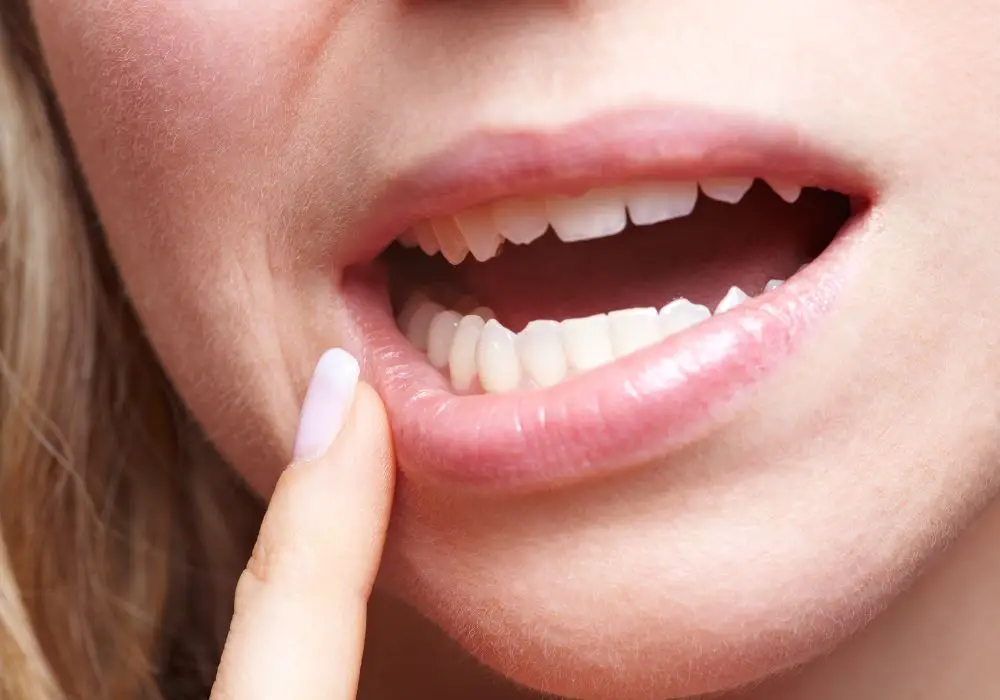
If the culprit behind your black spots is a cavity, it’s best to stop by the dental clinic. The sooner you get treated, the better your chances of reversing tooth decay and stopping its progression. What’s more, treating cavities will also reverse the discoloration.
But what if the black spots pose no threat to your health?
If so, you can reverse the black spots in the following ways.
1. Dental Prophylaxis
Dental prophylaxis is a dental cleaning treatment that involves removing dental plaque and tartar using a prophylaxis paste.
During the procedure, a dental hygienist will apply the abrasive paste to the affected tooth using an electric brush. The paste will break down plaque and remove bacteria, leaving your teeth clean and infection-free.
But remember, this aggressive tooth polishing procedure can chip away some of your outer tooth enamel.
On a positive note, dental prophylaxis can help prevent gum diseases and other health conditions, such as mouth cancer.
2. Over-the-Counter Teeth Whitening Products
Another simple remedy to get rid of black spots is to use OTC products. Invest in a fluoride tooth whitening paste with mild abrasives.
If you brush your teeth with this paste twice a day, you can scrub away surface stains and remove food debris and plaque. But be gentle when brushing your teeth to avoid damaging your delicate gums and causing them to recede.
Besides OTC whitening pastes, buy specialized antibacterial mouthwash to remove stains in hard-to-reach sections of the mouth. You can also get teeth whitening strips and gels to lighten the black spots.
Alternatively, you can schedule a professional tooth whitening session with your oral specialist.
3. Dental Bonding
Dental bonding or teeth bonding is a cosmetic procedure offering a more permanent solution for fixing black spots. It involves applying a tooth-colored resin material over the affected teeth to camouflage the discoloration.
But the dental bonding procedure extends past covering tooth discoloration. It also helps to do the following:
- Change the shape and size of teeth
- Hide gaps and space between teeth
- Conceal cracks and chips in teeth
4. Porcelain Veneers
Unlike teeth bonding, porcelain veneers last long. That explains why the procedure is expensive.
Porcelain veneers are custom-made shells that cover the front surface of a tooth to conceal cracks, chips, and discoloration. So, you can get them to cover the black spots on your tooth and enhance your smile.
5. Peroxide Based Tooth Bleaching
If you are looking for an affordable way to get rid of the black spots on your teeth at home, opt for hydrogen peroxide.
Head to your local drugstore and get a bottle of hydrogen peroxide. Next, mix equal amounts of water and peroxide and swish the solution in your mouth for around 30 seconds to 1 minute. Try not to swallow the mixture, and spit it out if it hurts your mouth.
You can also make a paste by mixing small amounts of peroxide with a few tablespoons of baking soda. After that, apply the paste on your teeth using a toothbrush and brush for 2 minutes. Finally, rinse your mouth with clean water.
But remember, high concentrations of hydrogen peroxide (above 3%) can cause tooth sensitivity to damage it.
How Can I Prevent Dark Spots on My Teeth?
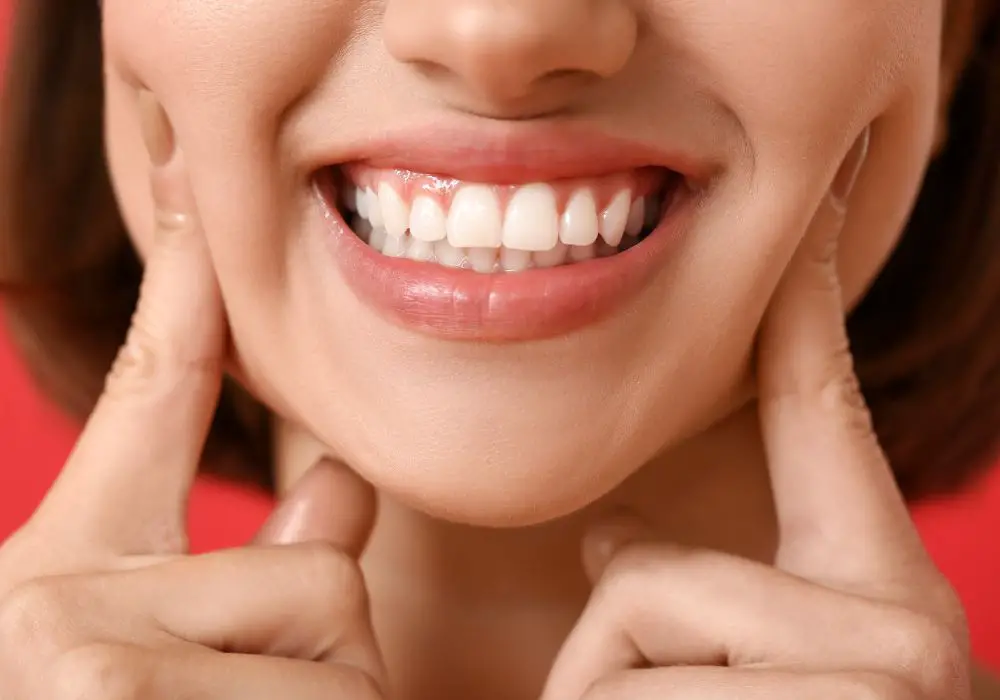
Arguably, the best way to keep your teeth blemish-free is to practice good dental hygiene. That means brushing your teeth with fluoride toothpaste for about 2 minutes. Don’t forget to floss your teeth to remove food debris that might get stuck between your teeth.
Moreover, use an antibacterial mouthwash to kill and keep enamel-consuming bacteria away.
Besides brushing and flossing, adopt these preventive measures:
- Avoid smoking and using nicotine products like chewing tobacco and dry snuff.
- Consume tooth-friendly food and drink water to maintain strong and healthy bones.
- Reduce your coffee and tea intake.
- Visit your dentist at least twice annually for check-ups and routine cleaning.
- Ask your dentist for suggestions on effective whitening treatments and teeth protective tips.
Conclusion
Black spots on your teeth can be bothersome, but it’s not something you can’t deal with. Simply consult your dentist to determine the cause and identify the best solutions.
If it’s caused by tooth decay, your dental surgeon might recommend treatments like root canals and other options.
But if the dark spots are cosmetic, use OTC teething whitening paste, teeth whitening strips, or peroxide-based products to eliminate them. On the other hand, you can get porcelain veneers or dental bonding.
If you have questions, you are welcome to leave us a message in the comment section.

